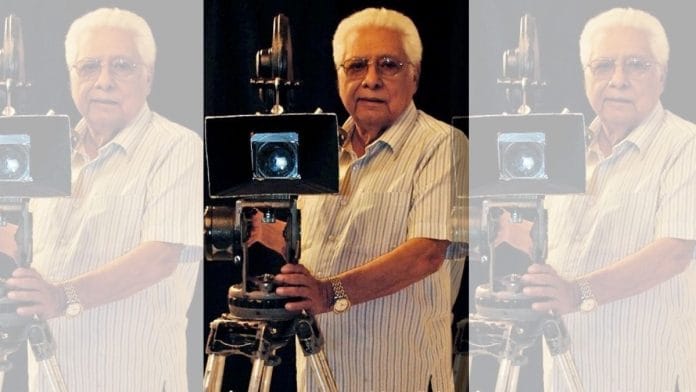That filmmaker Basu Chatterjee has died less than a week after Yogesh, who wrote the lyrics for the songs of so many of Chatterjee’s best films, and less than a year after his discovery, actor Vidya Sinha aka the Rajnigandha girl, makes it truly feel like the end of an era.
A late entrant to cinema, Chatterjee began his career as a cartoonist and illustrator with Blitz, a weekly Mumbai-based tabloid where he worked for 18 years. If Hrishikesh Mukherjee was the pioneer of middle cinema, Chatterjee, who began to make movies more than a decade after Mukherjee, was one of its finest architects.
Right from his 1969 debut Sara Akash to his last truly successful film Chameli Ki Shaadi (1986) and many in between and beyond, Chatterjee gave us films that had no heroes, no heroines, just simple, heartfelt stories of people who were like us.
Even as the frothy romances of the swinging ’60s were giving way to the shiny masala movies and action flicks of the 1970s, Basu Chatterjee paid no attention. Or maybe he did pay attention and consciously chose to tell different stories. His were neither the dancing-around-trees romances with big flourish, nor the high-octane sagas of the Angry Young Man fighting a rotten establishment. He told stories about people in whose lives, actually, not much happened. These were ordinary, mundane middle-class folk, leading ordinary, mundane, middle-class existences. But Basu Chatterjee found beauty in the quotidian, he made the ordinary extraordinary.
While most of his films were feel-good rom coms with beautiful music like Chhoti Si Baat, Khatta Meetha, Manzil and Baton Baton Mein, he also made more socially-conscious movies like Kamala Ki Maut and Ek Ruka Hua Faisla, that were darker and sadder, but always, always relatable and well-told.
Today, as we mourn the passing of of one of the finest filmmakers in Indian cinema, here is a look at five of his most iconic movies.
Rajnigandha (1974): A love triangle that starred no big names, Rajnigandha told the story of a woman’s confusion upon meeting her former lover. Starring the luminous girl-next-door Vidya Sinha along with everyone’s favourite Average Joe, Amol Palekar, and Dinesh Thakur, the movie is based on a story by Mannu Bhandari. It has, like many Basu Chatterjee films, lovely songs composed by Salil Chowdhury with lyrics by Yogesh.
Chhoti Si Baat (1976): The dream team of Basu Chatterjee, Vidya Sinha, Amol Palekar, Salil Chowdhury and Yogesh reunited after two years to give us this charming story that is as much a romantic comedy as it is an ode to Mumbai. Palekar plays Arun, a diffident, nondescript man where no one notices him, who is so in love with Prabha (Sinha) that he is willing to take a month off work to go to Khandala and be tutored in the ways of love. But he’s up against Prabha’s brash, suave colleague Nagesh (Asrani). So what we have is a hilarious tale of how these two men try to win her affections. And the soundtrack has Chowdhury and Yogesh at their best.
Manzil (1979): By this time, Amitabh Bachchan had become a bona fide superstar, with action movies such as Zanjeer and Don, masala hits like Amar Akbar Anthony and romantic dramas such as Kabhi Kabhie, but Chatterjee successfully transformed him into Ajay Chandra, a regular guy who has to borrow a suit, a car and an apartment from his friend so that he can pretend to be reasonably well-off and impress the love of his life, Aruna (Moushumi Chatterjee). What follows is a comedy of errors as his plans to get a job ends up with him being dragged to court by none other than Aruna’s father. Yogesh teamed up with composer R.D. Burman for the music, which is stellar.
https://youtu.be/T6w9i8Sq-K0?list=RDT6w9i8Sq-K0
Ek Ruka Hua Faisla (1986): Based on Sidney Lumet’s iconic 1957 courtroom drama, 12 Angry Men, the movie is a departure from Basu’s regular fare. A young boy from the slums is on trial for killing his father. If he’s found guilty, he’ll be sentenced to death. Every juror has already decided he is guilty, except for one, who slowly peels the layers off every argument to show that the evidence against the boy is circumstantial at best and cannot be considered as definitive. The movie stars some of the finest TV, stage and film actors, including Pankaj Kapur, M.K. Raina and K.K. Raina.
Kamala Ki Maut (1989): Another movie that is darker and sadder than much of Basu Chatterjee’s filmography, this one begins with a suicide. Kamala, a young, unmarried, college-going girl commits suicide when she finds out she is pregnant. While her neighbours in the chawl gossip about her life, inwardly, they all think about their own lives, their mistakes, their errors of judgement, the heady follies of their own youth, and they realise that everyone is exactly the same. The movie had a great cast, including Pankaj Kapur and Supriya Pathak, and introduced, in his first proper role, Irrfan Khan.






